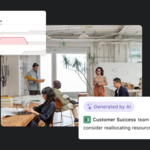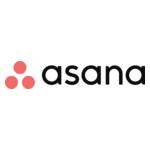Outlines Artificial Intelligence Principles for Development
SAN FRANCISCO--(BUSINESS WIRE)--Asana, Inc. (NYSE: ASAN)(LTSE: ASAN), a leading work management platform, announced its latest product capabilities focused on generative artificial intelligence.
Launched today, Asana Intelligence makes enterprise AI capabilities core to Asana’s work management platform, powering organizations to accelerate decision-making, improve productivity, and focus on what matters. Leveraging the Asana Work Graph®️, the essential foundation for facilitating human and AI collaboration, leaders will get real-time clarity into team, project, and business health, empowering organizations to make faster, more informed decisions. With Asana Intelligence, teams become more productive and gain the edge needed to accelerate their missions and business outcomes.
“Asana was made for this moment. We’ve been laying our AI foundation and product building blocks for years, and the recent developments in AI play right into our core strengths,” said Dustin Moskovitz, Co-Founder and Chief Executive Officer, Asana. “Asana is an AI-first product now and we intend to help customers maximize impact by weaving AI into the fabric of our architecture. We see a future where AI and human ingenuity combine to radically improve the lives of individuals and how teams work together, unleashing the full potential of every business and organization.”
Asana Intelligence Powers Human-AI Collaboration
With these latest product introductions, Asana Intelligence will support individuals and teams to do their best work and drive focus on what matters. Only Asana combines the power of artificial intelligence with the Asana Work Graph®️, a rich, connected map of an organization's work data, to amplify the impact of teams. Asana Intelligence enables companies to:
Accelerate decision-making
- Goal-based resource management: Monitors and intelligently surfaces resource recommendations to hit goals based on team capacity and changing business priorities.
- (Now available in beta) Health check: Identifies unseen issues and roadblocks, enabling efficient progress toward company objectives.
Improve productivity
- Self-optimizing workflows: Creates automated plans based on goals; suggests and implements workflow improvements to achieve results faster.
- (Now available in beta) Writing assistant: Enhances communication clarity and tone.
- (Now available in beta) Instant summaries: Transcribes and summarizes action items and highlights from meetings, tasks, and comment threads.
Maximize impact
- (Now available in beta) Ask Asana anything: Offers timely answers and insights on projects without additional meetings.
- (Now available in beta) Work organizer: Auto-generates custom fields, smart rules, and suggestions to add structure to projects.
Asana is quickly building in-product AI capabilities with new LLM features, powered by OpenAI, now available to customers in a closed beta.
“I'm incredibly excited about our participation in the Asana Intelligence beta and the possibilities it will unlock for our teams at Benevity,” said Rob Woolley, VP of Technology Operations, Benevity. “These capabilities will enable us to work more efficiently than ever, allowing us to better fulfill our mission of powering purpose-driven business.”
Asana AI Principles
Additionally, Asana has codified a set of artificial Intelligence principles that guide its research and development efforts.
As a company we are committed to using AI in service of helping humanity thrive. This includes ensuring AI safety and transparency in practice and in product. Achieving this vision for the application of AI requires meaningful co-creation between Asana, our customers, and our partners.
Asana’s Five Guiding Principles for human-centered AI
- AI should help people achieve their goals: We focus on helping individuals and teams achieve their goals and helping organizations deliver on their mission faster. AI should be used in service of augmenting, supporting, and celebrating people’s contributions like never before. Humans should always set the destination; AI is a tool to help them get there.
- We design for human + AI teams: AI has joined the team. We see enormous potential for AI to help teams to work together more effectively and efficiently. We will prioritize our efforts towards fostering the right workflows and partnerships between people and AI—catalyzing human-AI teamwork and ultimately empowering people.
- People are accountable for decisions: With Asana, AI will assist and enhance human decision-making. However, we believe accountability rests with people and will design our product accordingly. We also believe in providing people with choice and control over the role of AI in their work.
- We are committed to safety—in the short and long run: We believe AI will be transformative for humanity and for our mission, but we will balance speed with responsibility. In the near term, we will prioritize safety and security with AI providers. And we'll take the same approach while developing AI solutions. In the long run, we are motivated to ensure AI remains aligned with human values and objectives in Asana.
- We promote transparency, in practice and in product: We commit to being open and clear about our partnerships, security, data collection, data protection, and management practices. Transparency is also fundamental to our product ethos. We will build solutions that lead AI and humans alike to unpack their thinking and assumptions in order to strengthen our collective thought processes, foster trust, and build on each other’s ideas.
To learn more and see Asana Intelligence in action, join the live demo waitlist.
About Asana
Asana helps organizations orchestrate their work, from small projects to strategic initiatives. Headquartered in San Francisco, CA, Asana has millions of users in over 200 countries and territories. Global customers such as Amazon, Affirm, Japan Airlines, and Sky rely on Asana to manage everything from company objectives to digital transformation to product launches and marketing campaigns. For more information, visit www.asana.com.
Forward-Looking Statements
This press release contains “forward-looking” statements within the meaning of the Private Securities Litigation Reform Act of 1995 that are based on management’s beliefs and assumptions and on information currently available to management. Forward-looking statements include, but are not limited to, statements about our ability to execute on our current strategies, our technology and brand position, expected benefits of our offerings, Asana’s market position, and potential market opportunities. Forward-looking statements generally relate to future events or Asana’s future financial or operating performance. Forward-looking statements include all statements that are not historical facts and in some cases can be identified by terms such as “anticipate,” “expect,” “intend,” “plan,” “believe,” “continue,” “could,” “potential,” “may,” “will,” “goal,” or similar expressions and the negatives of those terms. However, not all forward-looking statements contain these identifying words. Forward-looking statements involve known and unknown risks, uncertainties and other factors, including factors beyond Asana’s control, that may cause Asana’s actual results, performance or achievements to be materially different from any future results, performance or achievements expressed or implied by the forward-looking statements. These risks include, but are not limited to, risks and uncertainties related to: Asana’s ability to achieve future growth and sustain its growth rate, Asana’s ability to attract and retain customers and increase sales to its customers, Asana’s ability to develop and release new products and services and to scale its platform, including the successful integration of artificial intelligence, Asana’s ability to increase adoption of its platform through Asana’s self-service model, Asana’s ability to maintain and grow its relationships with strategic partners, the highly competitive and rapidly evolving market in which Asana participates, Asana’s international expansion strategies, and the impact of the COVID-19 pandemic and broader macroeconomic conditions.
Further information on risks that could cause actual results to differ materially from forecasted results or anticipated impact are included in Asana’s filings with the SEC, including Asana’s Annual Report on Form 10-K for the year ended January 31, 2023 and subsequent filings with the SEC. Any forward-looking statements contained in this press release are based on assumptions that Asana believes to be reasonable as of this date. Except as required by law, Asana assumes no obligation to update these forward-looking statements, or to update the reasons if actual results differ materially from those anticipated in the forward-looking statement.
Contacts
Stephanie Hess
[email protected]











